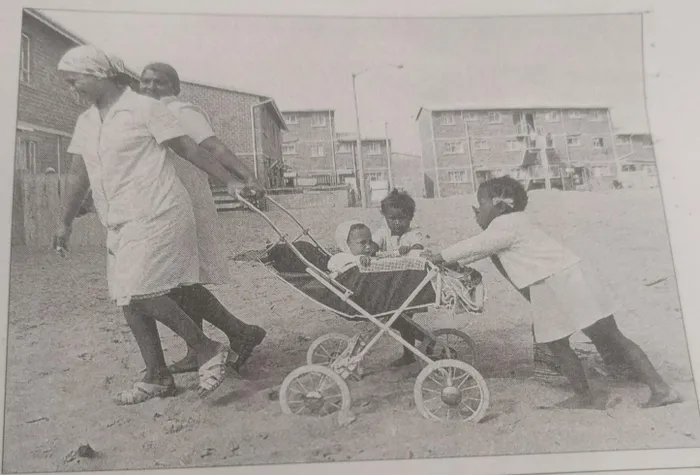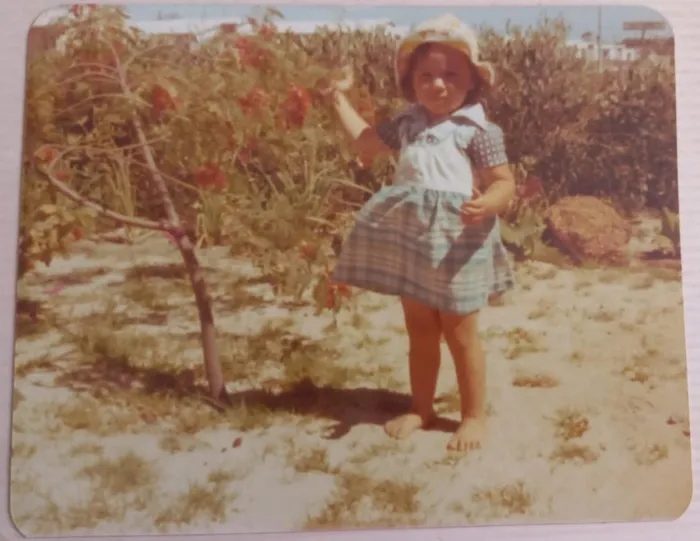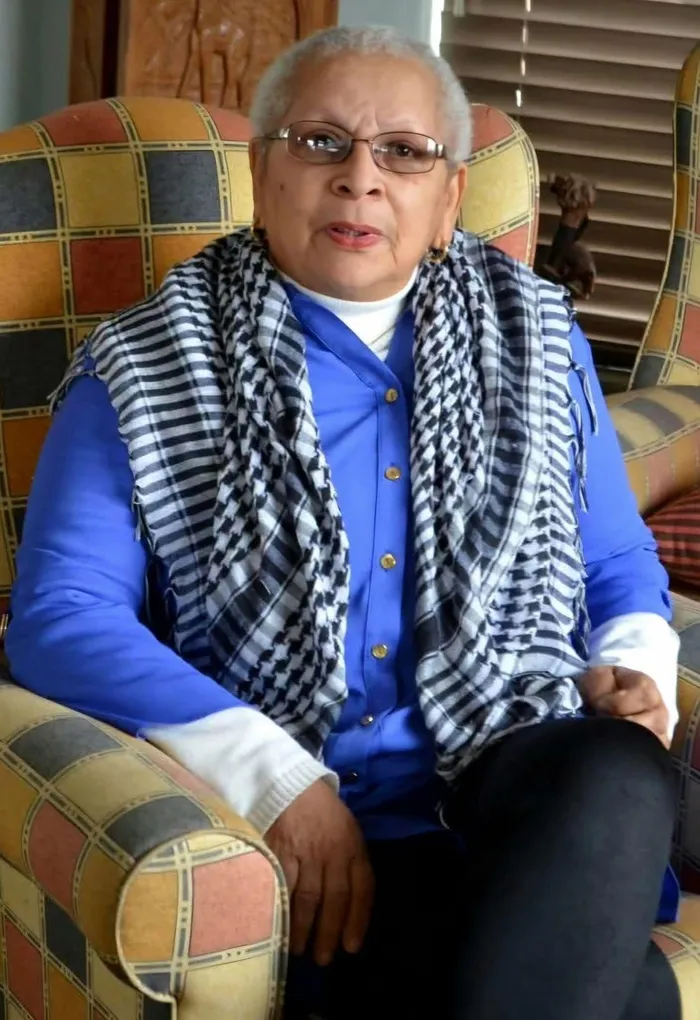Exploring the early years of Woodlands: A community's journey

Who can forget the grains of sand that seemed to get in everywhere when the south-easter blew? Heaps of sand were a part of life during the early years of Mitchell's Plain, as this picture taken in Woodlands shows.
Image: File
When Woodlands resident Yvonne Conrad, 79, and her late husband, Derrick first moved into their Eros Way home on December 4, 1976, their firstborn child, Genevieve (Claassen), was still an infant.
“We moved to Woodlands from Heathfield, where we lived in a separate entrance. It was heaven-sent to get this house, especially as Genevieve was only 10 months old,” Ms Conrad said.
“We were the second people who moved into this street. There were no roads or street lights. We had electricity, but the street lights only came afterwards. And oh my goodness, there was a lot of sand.
“The roads were rocky. It was another landscape altogether, and looked almost like the gopse because they were still building opposite us.
“One thing I must say is that they made kwai roads because we have not had any potholes in our street, till today,” she said.
Like many of Woodlands’ early residents, the Conrads had to travel outside Mitchell’s Plain to buy their household essentials. When they ran out of items, they depended on a mobile shop to buy what was needed.
“If you went shopping and you ran out of an item, you had to get it from the van that used to come around, or borrow from your neighbours,” she said.
Ms Conrad recalled her young family’s first Christmas after moving to Mitchell’s Plain.
“We didn’t have Christmas lunch here. I was the baby of the family, and everyone wanted me to come for lunch.
“We were still settling into our new home – we didn’t even have a Christmas tree, and went to Heathfield that first Christmas.
“It was only when Genevieve turned one that the whole family came for her birthday party,” she said.

Genevieve Claassen (née Conrad) was only 10 months old when her parents Derrick and Yvonne Conrad moved to Woodlands from Heathfield. She is seen here in front of her family home in Eros Way, Woodlands in 1978/79.
Image: Supplied
The Conrad family grew with the birth of their second daughter two years later. Both children attended Northwood Primary and Woodlands High. They also forged tight bonds with their neighbours.
“We became proper neighbours here. If I didn’t have something, I could go and ask for help.
“Over the years, some have passed away or moved out, and new neighbours moved in. But they are all the best neighbours one could have. My opposite neighbour takes me shopping every week,” she said.
Mr Conrad passed away in November 2021 after being diagnosed with cancer. Ms Conrad now lives with one of her granddaughters.
“It was a pleasure raising a family here. I can’t say it was a burden,” she added.
Ms Claassen, who now lives in Colorado Park, said she has fond memories of growing up in Woodlands.
“I was only 10 months old when we moved here. Next year, I will be turning 50 along with Mitchell’s Plain.
“I only have fond memories of this place. Growing up, Northwood Primary was up the road, and Woodlands was a road behind us. During the student uprisings and rioting, we could run straight home.
“Mitchell’s Plain was much safer back then. We would walk to Westridge and Lentegeur libraries. There was a feeling of community,” Ms Claassen added.

Former Cape Town Mayor Theresa Solomon, who passed away on Monday, July 2025 is remembered as a fearless activist and devoted Mitchell's Plain community leader, whose legacy continues to inspire generations.
Image: Facebook
In September 2019, Plainsman reporter Fouzia van der Fort, interviewed the late Theresa Solomon, a former Woodlands resident (“Theresa leaves her mark in ’Plain”, September 25, 2019). We look back on that story.
Theresa Mary Solomon, affectionately known as “Com T”, short for Comrade Theresa, and the original residents of the Woodlands area in the mid-1970s, proved that if they worked together on common causes, they could demand services from the council and the then apartheid government.
While they moved into a dormant town of sand dunes and houses, members of the Mitchell’s Plain Co-ordinating Committee (MPCC) never rested on their laurels but rather organised themselves and campaigned in a disciplined manner.
They rebuilt the dormitory township, which was where coloured people were designated to live, kilometres away from the city centre, where they worked.
Ms Solomon, her former husband Marcus Solomon, and daughter Lee-Anne (Levendal) moved into the area in the 1970s.
She and her neighbours had mobilised and formed the Woodlands Ratepayers’ Association, which then became the Woodlands Residents’ Association to include tenants. “When people started moving into Mitchell’s Plain, there were no schools.”
She said pupils had to be bused out of the area to attend schools elsewhere, and parents could not afford to pay school fees.
They arranged a bus to take the parents to the education department, which was then in Wynberg, and demanded transport for children to attend schools outside of Mitchell’s Plain.
“We wanted schools to be built before the houses.”
Margaret Kolbe, 81, who moved to Tafelsig in the early 1980s from Manenberg, attested to this. Her newly established residential area hardly had any infrastructure”(Decades of service," Plainsman, August 15, 2018).
However, within the first few days of being in a new house, she was paid a visit by activist Mr Solomon, one of the founders of the Cape Areas Housing Action Committee, one of the most instrumental organisations in the United Democratic Front, who encouraged her to get involved with lobbying for a school in the area.
A political and social activist, Mr Solomon is also the founder of the Children’s Resource Centre which recognises children as potential change agents. e was imprisoned on Robben Island for 10 years, then under house arrest for another five years, due to his political activism in the Western Cape.
Ms Kolbe was hailed for her community involvement in, among others, the Tafelsig Residents’ Association, the Tafelsig Health Committee and its project for malnourished and underweight children, the school governing body of Tafelsig High School and in the Tafelsig branch of the ANC.
As an ANC activist Ms Solomon helped to form the Tafelsig Residents’ Association, as well as the Portland Ratepayers’, Westridge Ratepayers’, Eastridge Residents’, Lentegeur Residents’, and Woodlands Residents’ associations.
These associations all worked together under the umbrella body of the Mitchell’s Plain Civic Association in late 1975.
Four years later, the council increased the rent thrice in one year. “The community could not afford that,” recalled Ms Solomon.
“So, on New Year’s Eve in 1979, hundreds of people marched to the council’s Woodlands office and handed a petition with 600 signatures demanding an end to all of the increases. This was a major victory for the civic organisation,” she said.
The need for a general hospital was voiced with the slogan: “We want a hospital for health and not for profit”, she recounted.
In the interim, the health department built Lentegeur Psychiatric Hospital.
“We asked for a general hospital and not for a psychiatric hospital, which was also necessary considering all of the challenges the people of Mitchell’s Plain were facing.”
The fight for a general hospital is part of the history of Mitchell’s Plain, said Ms Solomon. At the time, there was only one ambulance servicing Mitchell’s Plain.
Mitchell’s Plain District Hospital, in AZ Berman Drive, Lentegeur, only opened its doors in 2013 with the first patients transferred to the hospital on Monday, July 1, 2013.
“We had no police station, which again residents had to lobby for and got a house in Westridge.”
The population outgrew the make-shift police station in Silversands Avenue (Westridge), and the Mitchell’s Plain police station opened in 1989, followed by Strandfontein police station in 2000 and Lentegeur police station in 2013.
Ms Solomon said they also canvassed for a pedestrian bridge over Eisleben Road, where they recorded several accidents and deaths.
“We were settled with pedestrian crossings, but the crossing of the road and the accidents were really traumatic,” she said.
Another matter the association tackled with the Electricity Petition Committee (EPC) was calling for a standardised single monthly payment of electricity. Ms Solomon said throughout these trying times, while fighting these issues, she and many other activists were detained on several occasions.
“We were in the forefront of the struggle in Mitchell’s Plain. “We used to go to the City council, and we had set a standard of discipline,” she said.
Ms Solomon said these are but a few issues they raised and dealt with as a community, with organised structures and committees who were prepared to serve.
There was a Woodland People’s Centre in Orpheus Crescent. There was a creche, a resource centre, an advice office, a computer centre, a hall and a library, which local pupils managed.
She said the structures needed to be acknowledged as the people took up important issues to realise a better life for all.
Ms Solomon said the struggle was never against "white people" but rather against the system of exploitation.
“I sacrificed nothing. It was a way of life. Struggle for us was a way of life. This was our commitment that the children of South Africa would have a better life.
“The future needs to be dealt with today. We were taught at an early age to be responsible citizens. We were ensured a value system by our parents to have a strong community,” she said.
Ms Solomon said former Plainsman reporter and Cape Community Media editor, Simonéh de Bruin was the contact for their organisation.
“A lot of praise must go to the Plainsman who popularised our organisation. Simonéh was always there at our events. She was a young fresh journalist, who was very accommodating.
“In the ever-changing world of community, I miss that link of having a journalist with whom we could connect and share our news with,” she said.